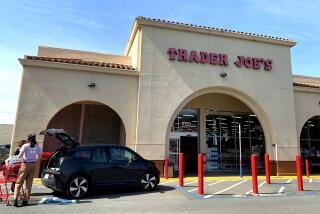Workers to Acquire Lumber Mill : Wall St. Gives Main St. a Hand in Plant Buyout
- Share via
OMAK, Wash. — It is a tale of knights and commoners, of forest and town, of stocks and bonds.
While the employees’ purchase of a lumber mill in this small Washington town is not the stuff of legend, it certainly has a touch of the romantic.
The 635 union members at Omak Wood Products Inc., who out-hustled large corporations to purchase their jobs and their economic futures, pulled off something special in the annals of American business.
Rarely have employees been able to purchase a profitable business coveted by other corporations. Employee buyouts usually occur only in troubled companies.
They did it by drawing the fancy of Sir James Goldsmith, the British knight who owned the plant, along with the bottom-line financial interest of Wall Street’s largest “junk bond” underwriters.
“It scares the hell out of me,” said Lloyd Groomes, business agent for the local Lumber & Sawmill Workers Union, who launched the bid to buy the plant.
“We don’t have two nickels to rub together, but we’re going into debt of $40 million,” he said recently. “It’s darn exciting.”
By Groomes’ count, the sprawling plywood manufacturing and log-cutting plant that is the largest employer in this town of 4,000 had been sold three times in the past 32 years.
Swift Action by Union
Each time the new owners cut the labor force, which once totaled 1,200, and took the profits out of the community, situated in a remote area of north-central Washington 225 miles east of Seattle.
The workers learned earlier this year that Goldsmith, the corporate raider who acquired the plant when he took over Crown Zellerbach Corp. in 1985, intended to sell.
The idea of employee ownership was first aired at a union meeting this summer, and it immediately caught on in this economically battered town near the Canadian border, where the unemployment rate usually hovers near 14%.
The union immediately put up $5,000 for consulting fees; another $5,000 was raised in the community. Workers also voted to set aside 10% of their wages, if needed, to help pay off purchase loans.
The Washington State Employee Ownership Program was brought in to give advice. Drexel Burnham Lambert Inc. was chosen to handle the financing.
The Wall Street investment firm structured the transaction, handled much of the negotiating with Goldsmith and is presently working to raise the $45 million to $50 million needed, said David Aylward of Aylward & Finchem, the Washington law firm representing the buyout group.
“We are very confident it’s going to happen,” he said.
Bid for Plant, Land
The bid for 60% of the plant was submitted in September and is a complicated series of financial arrangements, including junk bonds and loans to be repaid from future earnings. The union made no down payment and the plant itself was put up as security.
The $35-million bid was for the sawmill, plywood manufacturing plant and 47,000 acres of timberland. An additional $10 million to $15 million will be raised for working capital.
Goldsmith had several offers for the profitable Omak plant, part of his Cavenham Forest Industries Inc. division, but the employee buyout caught his attention, said Jim Keogh, head of the state’s employee ownership program.
“He ended up taking a personal interest and became intrigued with it,” Keogh said.
Aylward, who helped negotiate with Goldsmith over a six-week period, said the financier’s benevolent attitude toward the union was another surprise.
“His last major publicity in this country was a hostile attempt to take over Goodyear,” Aylward said. “He’s not known for doing transactions with unions.”
But Goldsmith treated the union offer with respect and worked with their representatives to complete the deal, Aylward said.
When the deal closes on Dec. 12, employees will own about 60% of the stock. Goldsmith will retain 10% ownership, and the rest will be owned by investors. Employees, managers and investors will be directly represented on the nine-member board.
Aylward said the present management team is likely to stay on.
More to Read
Inside the business of entertainment
The Wide Shot brings you news, analysis and insights on everything from streaming wars to production — and what it all means for the future.
You may occasionally receive promotional content from the Los Angeles Times.










